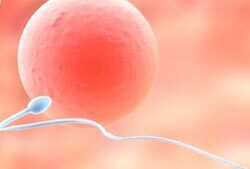Pregnancy does not always come when the couple decided that it's time to have a baby. Some couples after a year of unsuccessful attempts, doctors put infertility and begin to find out the reasons why pregnancy does not occur.
And if a man can be examined for infertility very quickly( you just need to pass a spermogram), then a woman's examination can drag on for months and will require money, patience, and sometimes courage, as some diagnostic measures are quite painful.
Contents of
- 1 Causes of conception problems
- 2 Infertility symptoms in women
- 3 Female infertility grades
- 4 Infertility diagnosis in women
- 5 Infertility treatment in women
- 6 5 general recommendations
Causes of problems with conception

The absence of pregnancy for a long time is a consequence of dysfunctions of the endocrine, immune systems,infectious diseases, inflammatory processes or congenital pathologies of the organs of the reproductive system.
Hormonal factor
This is one of the most common causes of infertility in women. About the malfunctioning of the endocrine system can not be known by a simple gynecological examination or ultrasound. The exact answer will be given only by the results of blood tests for hormones.
Excess testosterone - affects the formation of the dominant follicle in the ovaries and the ability of the capsule of this follicle to break through and release a mature egg. Women with excess testosterone may suffer from the formation of follicular cysts.
Disadvantage of estradiol - estrogens affect the growth of the dominant follicle and the thickness of the endometrium in the uterus. If these hormones are deficient, the dominant follicle may not form, or grow, but regress before ovulation itself.
And the layer of the endometrium usually increases very slowly and by the time the egg leaves the follicle it reaches only 5-6 mm instead of the prescribed 13-14 mm.
LH deficiency - luteinizing hormone is responsible for rupturing the capsule of the dominant follicle. If the integrity of its wall is not broken, then the dominant follicle will grow into a cyst.
Excess prolactin - can block the onset of ovulation and promote regression of the dominant follicle, even if it ripens to large sizes.
These are just a few examples of hormonal infertility in women. In fact, all of the above factors can be present either individually or in combination with each other.
For example, very often elevated testosterone causes a decrease in the level of estrogens in the blood.
Pipe factor
The inability to conceive a child is sometimes due to the obstruction of the fallopian tubes.
This paired organ plays the leading role in the process of fertilization - it is there that spermatozoa meet with the egg, from there the fetal egg descends into the uterus for several days to be implanted in one of its walls.
In the presence of adhesions in the fallopian tubes, if full or partial obstruction is diagnosed, there are two possible outcomes:
- Spermatozoa can not penetrate the cavity of the tube and fertilize the egg.
- Spermatozoa can reach the tube and fertilize the egg, but the egg can not fall into the uterus because of the adhesions it can not. As a result, it is implanted in the wall of the fallopian tube and pregnancy becomes ectopic.
Fallopian tubes may not be present at all in the pelvic cavity due to a congenital anomaly of development, or because of the removal of both tubes after ectopic pregnancies.
Immunological factor

Immunological factor of female infertility
This cause of infertility is expressed in the fact that a woman has antibodies to spermatozoa. As a rule, these are IgG, IgA and IgM immunoglobulins.
Moreover, the immunological factor can cause infertility in both women and men. Antibodies, depending on their class, can be attached to the head or to the tail of the sperm. This has a different effect on its ability to fertilize an egg.
For example, antibodies of IgG class, attached mainly in the head of the spermatozoon, deprive it of the ability to break through the shell of the egg. This means that viable sperm can not perform fertilization, even if it has reached the fallopian tubes.
Immunological factor of female infertility is little studied, although it is often found: among all women with infertility, 15% have infertility of an immunological nature.
Endometriosis
Endometriosis overgrowth, especially if it occurs in the uterine cavity, is fraught with the fact that the fetal egg can not properly fixate on its wall.
The endometrial layer will be so thick that it can peel from the uterine cavity together with the fertilized egg attached to it.
These are the main causes of problems with conception, which are especially common among women with infertility.
In addition to them, pregnancy can not take place because of anomalies in the development of the organs of the reproductive system, stress, as a result of genetic malfunction, tumors of the uterus of various genesis.
Signs of infertility in women

About infertility can not be guessed, but in most cases there are certain symptoms that directly or indirectly indicate that with the conception of the child will be a problem.
There are several signs of infertility in women:
- Menstrual irregularities. This does not always mean that there will never be a pregnancy, but such failures are a reason to undergo a thorough examination.
- Absence of pregnancy, if within a year the couple lives an active sexual life and is not protected.
- The absence of pregnancy, if a couple tries to conceive a baby for six months, based on the data of folliculometry, and having good spermogram parameters at the same time.
Degrees of female infertility
 In medical practice, infertility is called either primary or secondary.
In medical practice, infertility is called either primary or secondary.
Sometimes they can diagnose both primary and secondary infertility in women, though not simultaneously - consistently, at different periods of her life.
Primary infertility - is given in the event that the pregnancy has not occurred ever, provided that the patient has had an active sexual life without the use of contraceptives.
Secondary infertility - is put in the event that a woman at least once in her life was pregnant. It does not matter: whether this pregnancy ended with the birth of a child or a miscarriage.
The determining factor for staging 2 degrees of infertility is the impossibility of conception at the moment, in spite of the fact that it became possible to get pregnant earlier.
Diagnosis of infertility in women
Methods of diagnosing female infertility will entirely depend on the reason that the organs of the reproductive system brought to a state where pregnancy became impossible.
- Study of the hormonal background.
- Immunological study of female secretion for the presence of ACAT( antisperm antibodies).
- ultrasound.
- GHA and CCC - to study the patency of the fallopian tubes.
- Laparoscopy - is used most often in cases when the doctor is unclear reasons that prevent a woman from becoming pregnant.
- A snapshot of a Turkish saddle is an X-ray examination that helps determine the anomaly of the development of the skull that may interfere with the normal functioning of the pituitary gland.
Diagnosis of infertility in women takes a lot of time, most often a few months. This is because many analyzes and studies need to be carried out only on certain days and phases of the cycle.
Treatment of infertility in women
Like diagnosis, treatment regimens completely depend on what factor caused infertility.

Infertility treatment methods
If one day managed to get rid of problems that prevent getting pregnant, this does not mean that in the future they will not repeat, so the effect of infertility treatment in women is often temporary.
Medication treatment
Includes drugs whose action is aimed at leveling the hormonal background, to eliminate inflammation or to suppress the immune system, if the cause of the absence of pregnancy is the immune factor.
Specific drugs in this case, it is difficult to call, as the treatment scheme is individual and can be aimed at eliminating several diseases at once, due to which the infertility is diagnosed.
Antibacterial agents - used in the treatment of STDs, the presence of which caused inflammation of the organs of the reproductive system.
Hormones - are used for failures of the endocrine system, as well as for achieving Rebound effect( conception of the child on the background of abolition of oral contraceptives).
Means of immunosuppressive therapy - designed to suppress the immune response of the body to the partner's spermatozoa.
Physiotherapeutic treatment
Most often used in cases where the patient is diagnosed with spikes in the fallopian tubes, with partial obstruction.
Electrophoresis is used with preparations that have a resolving effect( lidase, sodium trioxide).
In a hospital setting, douches are used with medicines that also have the ability to dissolve mature collagen and have an anti-inflammatory effect.
Surgical treatment
It is used in cases when conservative therapy does not have any effect, or when it is clear from the beginning that medication will not bring any results.
Surgery is required in the following cases:
- Complete or partial obstruction of the fallopian tubes.
- Plasty of Fallopian tubes.
- Anomalies in the structure of the uterus and appendages.
- Endometriosis.
- Ovarian cysts.
- Tumors of the uterus.
Artificial insemination
IVF, ICSI and AI are infertility treatments that can help when even surgical intervention is powerless. However, their use is associated with two difficulties: the high cost of procedures and a rather low percentage of embryo survival.
- ECO - involves mixing in one tube several eggs and spermatozoa, and then replanting 1-2 or 3 eggs in the uterus.
- ICSI - involves the artificial input under the shell of an egg of a single sperm. The resulting embryo will also be transferred to the uterus for subsequent implantation.
- AI - involves entering a portion of processed sperm directly into the uterine cavity, bypassing its passage through the cervix.
When carrying out IVF and ICSI, a woman takes a puncture of ovaries from the ovary after stimulation of superovulation.
5 general recommendations

1. Do not delay the visit to the doctor if during the year of regular sexual activity without the use of contraceptives, the pregnancy has not occurred. Remember: time does not work for you, and the reproductive function of women is significantly limited.
2. Do not self-medicate - this can exacerbate existing problems. Appoint competent treatment can only gynecologist or gynecologist-reproductologist( its functions and powers are much wider than that of a simple gynecologist).
3. For preventive purposes, visit the gynecologist once a year, donate blood to hormones and do ultrasound of the pelvic organs.
4. An extensive inflammatory process in the fallopian tubes can be avoided if treatment is started upon detection of a small amount of adhesions.
5. Abortion often becomes a cause of infertility, because it inflicts far more harm to the reproductive system than normal non-burdened births.
Therefore, sexual intercourse and contraceptive means must be taken seriously to prevent unwanted pregnancies, which then will have to be disposed of.



